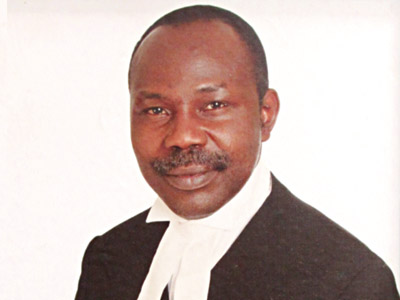A new dawn just suddenly arrived globally, Nigeria inclusive. It is one in which everyone is scampering for safety. Safety valves are being triggered globally to save humanity. While some countries that have prepared for the rainy day were not caught unawares by the COVID-19 pandemic, some were caught pants down. The latter category is where our dear country belongs. Nigeria is unable to effectively respond to the eventuality that has visited us, not so much in terms of health alone but in virtually all sectors. 
In the health sector, Nigerians across board, right from the parliamentarians to the executive, all agree that the country does not have the wherewithal to confront the pandemic. In fact, at a point in time, the Secretary to the Government of the Federation, who doubles as the chairman of the Presidential Task Force on COVID-19, had to confess that he never knew that the state of our health facilities was this bad. In the judiciary, hearings in the different courts have been suspended for more than a month, as we never really prepared for virtual hearings, in terms of legal framework or technologically.
In fact, in most of the courts that have attempted both e-filings and recordings, let me mildly and courteously say the output has not been impressive, to say the least. In the educational sector, we have not promoted e-learning and now, emergency and caricature mechanisms are dished out daily to bridge the vacuum. In some cases, students must go and sit before the television or listen to radio broadcast to learn, or, where able, join unfamiliar e-learning platforms. This is in the midst of no electricity, no Internet service. Even where there is Internet penetration, the epileptic nature will not permit any meaningful learning. Woefully in all these, there is hardly steady power supply to operate the devices and, where there is, it is not affordable to majority of Nigerians whose children are to benefit from the e-learning, as a sizable number of them are daily earners, the self-employed and transporters.
It would be regrettably recalled that the Minister for Power recently declared that two-month free electricity is impossible for citizens who were compulsorily locked down at home, just because some rich people will benefit from it. The minister forgot that the percentage of these rich people is insignificant relative to the majority of the poor and vulnerable people in the country. He also forgot that pertinent to all Nigerians now is information dissemination, without which the fight against the pandemic is impracticable. The mode of getting this information largely requires power to energize the equipment. He also ignorantly claimed that 80 per cent of poor people lacked access to light. One wonders why we, thereforem need a Minister for Power! He, therefore, in his wisdom or reasoning, chose to throw the baby and the bathwater away. He forgot that the same government he serves, under the Ministry of Education, expects all pupils all over the federation to learn through the devices alluded to above. If 80 per cent of the children of the poor lack access to the facilities provided, then why invest in it?
This shows the haphazard reasoning of the Federal Government team. I can continue to enumerate the state of unpreparedness in all the sectors of the economy but suffice to just state that COVID-19 has helped unveil the weaknesses of our various institutions, including even our economy.
The question is, how did we get here? A lot of writeups have attempted to address this recently but one area that I have not seen exposed is that of patronage and, by extension, the incompetence of most public officials.
In Part 2 of this piece, coming next Thursday, God willing, I shall further x-ray the evils of the incompetence; how it has wreaked havoc on our nation’s health. The issue of patronage in government is one that will appear to me as a militating factor against the growth of our nation. The country is haemorrhaging all over but this area is one of the deadliest areas that we need to treat, hence this diagnosis and prognosis.
This area, of course, basically concerns the social scientists like psychologists, sociologists and others. Hope they will pardon my incursion into the area. However, as lawyers, we pride ourselves as learned because we claim to know virtually everything. Law itself is considered an instrument of social engineering, thereby making myself a social engineer.
An online dictionary defines “patronage” as “the power to control appointments to office or the right to privileges.” Patronage, in this regard, has multiple connotations or means of manifestation or by which it is exercised, depending on particular situations, context or perspectives. The commonest areas of manifestation in Nigeria are award of contract and appointments.
Imagine putting an incompetent person in office as a result of patronage, wrongful location of project due to patronage borne out of ethnicity, sheer irredentism or clannish nepotism, etc. I am not too sure that patronage is a bad concept on its own, as resources are meant to be allocated, appointment to offices are meant to be made as part of governance processes, while privileges definitely may not necessarily connote allocation based on merit. It is where patronage is wrongly done and is injurious to our collective interest that it becomes worrisome. A further peep will reveal this fact. However, before delving more, it is important to point out that patronage in the public sector is mostly premised on political considerations and could be another manifestation of corruption or corrupt tendencies. In the private sector, factors like corruption, ethnicity, religion, etc, do not usually play pivotal roles or are not as pronounced as they are in the public sector.
I am, therefore, more concerned about the public sector for two basic reasons. First, it is a sector in which I have had the opportunity of serving for some years and could see its evil effects on our general interests, and, second, it is an area that concerns and affects all of us. Let me proceed by stating that I cannot confidently say what obtains in most advanced countries in terms of political patronage but I suspect strongly that it cannot be said to be totally non-existent. Again, I am equally not too confident that it is absolutely evil to give political patronage. Correct me if am wrong.
However, where such patronage is carried out to the detriment of our collective interest, then, we must be concerned. In other countries, patronage is carried out in a manner that gives major consideration to the collective or national interest first. Even where such is to be done, respect and compliance with due process is often adhered to. In award of contracts, for example, in advanced countries, contracts are not simply awarded on the strength of political considerations. A situation where a complete illiterate is awarded a building contract without any competence, just because of the political role he played, which enabled the incumbent somewhere to ascend to power, must be deprecated as not being well intentioned.
In Nigeria, I am aware that, at virtually all levels, there are procurement rules arising out of the Procurement Act or Law, depending on whether it is at the national or state level. These statutes are so robust to ensure clear award of contracts to competent hands. However, what do you find? Complete neglect or compromise of the process is the order of the day.
The laws are rather implemented in the breach than observance. Where is the compliance officer? What is he doing? How can contracts be awarded without due compliance with rules and regulations? Probably the compliance officer is in a trance or truancy. Not so much because he wants to be in all cases but because there is a superior directive that must be complied with if he still wants to retain his seat or, rather to his personal advantage, he is already compromised. What we then end up with is the award of projects to incompetent hands with the catastrophic consequences of abandonment, compromise of standards and/or poor project delivery. Where you are lucky, the project eventually gets delivered over an unreasonable length of time than contracted with costs of completing the projects several times reviewed resulting in over-inflation of budgets.
Nothing still happens, as we are a nation of no consequence, since the offender is ‘one of us,’ whereas several supposed beneficiaries of the public utility intended to be provided have suffered or paid the price of the delay, at times, with death. Hospital projects, for example, when delayed or stifled, have claimed several casualties beyond what statistics in nations of no records can cope with. It is equally the case that road projects that take decades to complete have not only killed the economy in terms of man hours spent on the road without contributing anything to economic development but have also made many travellers food for the famished roads.
The interesting thing is that we have laws that are pretentious about patronage, the Independent Corrupt Practices Act, the Economic and Financial Crimes Commission Act, the Procurement Act etc. The laws are there truly in the statute books but are incapable of self-execution and human agents that are to make them valuable and effective would seem to have abandoned their duty posts in many cases.





